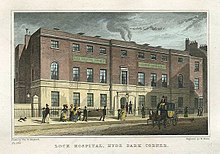
Lock hospital
A lock hospital was an establishment that specialised in treating sexually transmitted diseases. They operated in Britain and its colonies and territories from the 18th century to the 20th.
History
The military had a close association with a number of the hospitals. By the mid-19th century most of the larger army bases in India were home to a lock hospital. There were more military than civil lock hospitals in India, due to the prevalence of venereal diseases amongst British troops. In 1858 the Admiralty paid to have one opened in Portsmouth and in 1863 another in Plymouth.
The earliest lock hospitals in India were established around 1797 at Berhampur, Kanpur, Danapur, and Fatehgarh. They were usually within bazaars, surrounded by a mud wall and staffed by a doctor and a female nurse. The local police were in charge of rounding up women suspected of being diseased, who could return home only after obtaining a certificate of discharge.
Lock Hospital operated in Hong Kong from 1858 to 1894 to deal with venereal diseases.
The term "lock hospital" originates from their use as leprosariums, in which the patients were kept in restraints.
See also
- London Lock Hospital
- Westmoreland Lock Hospital, Dublin
- Contagious Diseases Acts
- Glasgow Lock Hospital
External links
|
Articles about hospitals
| |
|---|---|
| Common hospital components |
|
| Archaic forms |
|
| Geographic service area | |
| Complexity of services | |
| Unique physical traits | |
| Limited class of patients | |
| Funding | |
| Condition treated | |
| Century established | |
